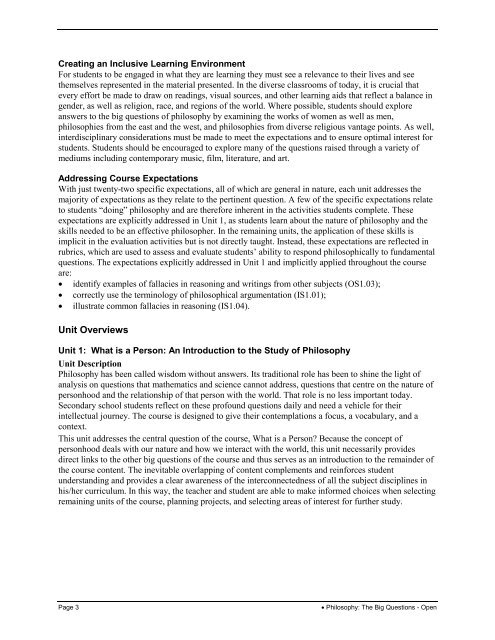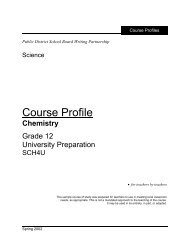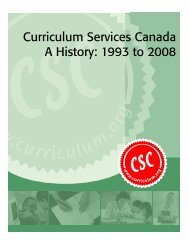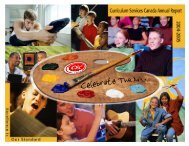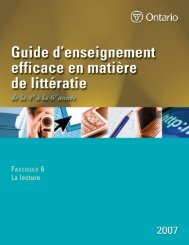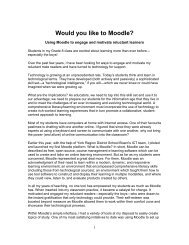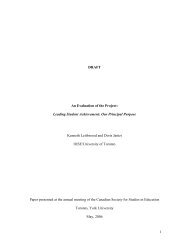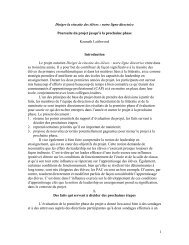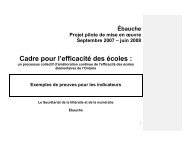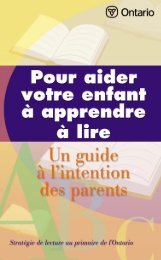Course Profile - Curriculum Services Canada
Course Profile - Curriculum Services Canada
Course Profile - Curriculum Services Canada
Create successful ePaper yourself
Turn your PDF publications into a flip-book with our unique Google optimized e-Paper software.
Creating an Inclusive Learning Environment<br />
For students to be engaged in what they are learning they must see a relevance to their lives and see<br />
themselves represented in the material presented. In the diverse classrooms of today, it is crucial that<br />
every effort be made to draw on readings, visual sources, and other learning aids that reflect a balance in<br />
gender, as well as religion, race, and regions of the world. Where possible, students should explore<br />
answers to the big questions of philosophy by examining the works of women as well as men,<br />
philosophies from the east and the west, and philosophies from diverse religious vantage points. As well,<br />
interdisciplinary considerations must be made to meet the expectations and to ensure optimal interest for<br />
students. Students should be encouraged to explore many of the questions raised through a variety of<br />
mediums including contemporary music, film, literature, and art.<br />
Addressing <strong>Course</strong> Expectations<br />
With just twenty-two specific expectations, all of which are general in nature, each unit addresses the<br />
majority of expectations as they relate to the pertinent question. A few of the specific expectations relate<br />
to students “doing” philosophy and are therefore inherent in the activities students complete. These<br />
expectations are explicitly addressed in Unit 1, as students learn about the nature of philosophy and the<br />
skills needed to be an effective philosopher. In the remaining units, the application of these skills is<br />
implicit in the evaluation activities but is not directly taught. Instead, these expectations are reflected in<br />
rubrics, which are used to assess and evaluate students’ ability to respond philosophically to fundamental<br />
questions. The expectations explicitly addressed in Unit 1 and implicitly applied throughout the course<br />
are:<br />
• identify examples of fallacies in reasoning and writings from other subjects (OS1.03);<br />
• correctly use the terminology of philosophical argumentation (IS1.01);<br />
• illustrate common fallacies in reasoning (IS1.04).<br />
Unit Overviews<br />
Unit 1: What is a Person: An Introduction to the Study of Philosophy<br />
Unit Description<br />
Philosophy has been called wisdom without answers. Its traditional role has been to shine the light of<br />
analysis on questions that mathematics and science cannot address, questions that centre on the nature of<br />
personhood and the relationship of that person with the world. That role is no less important today.<br />
Secondary school students reflect on these profound questions daily and need a vehicle for their<br />
intellectual journey. The course is designed to give their contemplations a focus, a vocabulary, and a<br />
context.<br />
This unit addresses the central question of the course, What is a Person? Because the concept of<br />
personhood deals with our nature and how we interact with the world, this unit necessarily provides<br />
direct links to the other big questions of the course and thus serves as an introduction to the remainder of<br />
the course content. The inevitable overlapping of content complements and reinforces student<br />
understanding and provides a clear awareness of the interconnectedness of all the subject disciplines in<br />
his/her curriculum. In this way, the teacher and student are able to make informed choices when selecting<br />
remaining units of the course, planning projects, and selecting areas of interest for further study.<br />
Page 3<br />
• Philosophy: The Big Questions - Open


